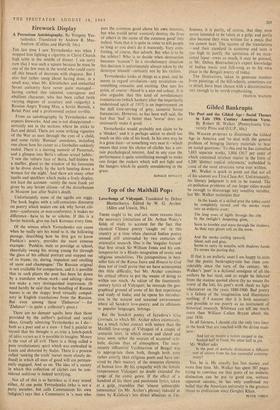Gilded Bankrupts
The Poet and the Gilded Age : Social Themes in Late 19th Centdry American Verse. By Robert H. Walker. (Pennsylvania Uni- versity Press and O.U.P., 60s.) MR. WALKER proposes to illuminate the Gilded Age in America and 'to deal with the general problem of bringing literary materials to bear on social questions.' To this end he has consulted 5,883 separate works, 1,804 (30.7 per cent) of which contained revelant matter in the form of 4,200 `distinct topical references,' embedded in sonic of the most atrocious verse ever written.
Mr. Walker is quick to point out that not all of his sources are First-Class-Art. Unfdrtunately, his literary judgment is not to be trusted. The air-pollution problems of our larger cities would be enough to discourage tiny sensitive versifier, but Mr. Walker maintains that
In the hands of a skilled poet the tables could be completely turned and the smoke made into an vesthetic asset :
The long rows of lights through the city In the twilight's deepening glow, Seem to tremble and wave through the shadows, As their rays gleam soft on the snow.
And the smoke curling upward, Silent, soft and gray, Seems to carry its wreaths, with shadowy hands To crown the parting day.
If that is an testhetic asset I am happy to state that the poetic bankruptcy-rate has risen con- siderably since the turn of the century. Mr. Walker's 'poet' is a fictional amalgam of all the authors he has read, and as might be inferred from the stanzas quoted above (by no means the worst of the lot), his poet's work sheds no light whatsoever on the years 1880-1900. Bad poetry is a failure of the imagination and illuminates nothing; if I assume that it is both necessary and possible to use poetry as an instrument of historical research; Whitman can tell me much more than William Cullen Bryant about the year 1850.
In all fairness, I should cite the only two lines in the book That are touched with the divine mad- ness: And yet we mourn a nation steeped in sin; Soaked half in fraud, the other half in gin.
Mr. Walker asks
Is the poet of msthetic distinction a different sort of citizen from his less successful contemp- orary?
Yes, he is. He usually has less money and more free time. Mr. Walker has spent 387 pages trying to convince me that p,oets of no wsthetic distinction can be put to good use, without apparent success;, he has only confirmed my belief that the American university is the greatest hreat to civilisation since Genghis Khan.
PETER COHI.N






























 Previous page
Previous page